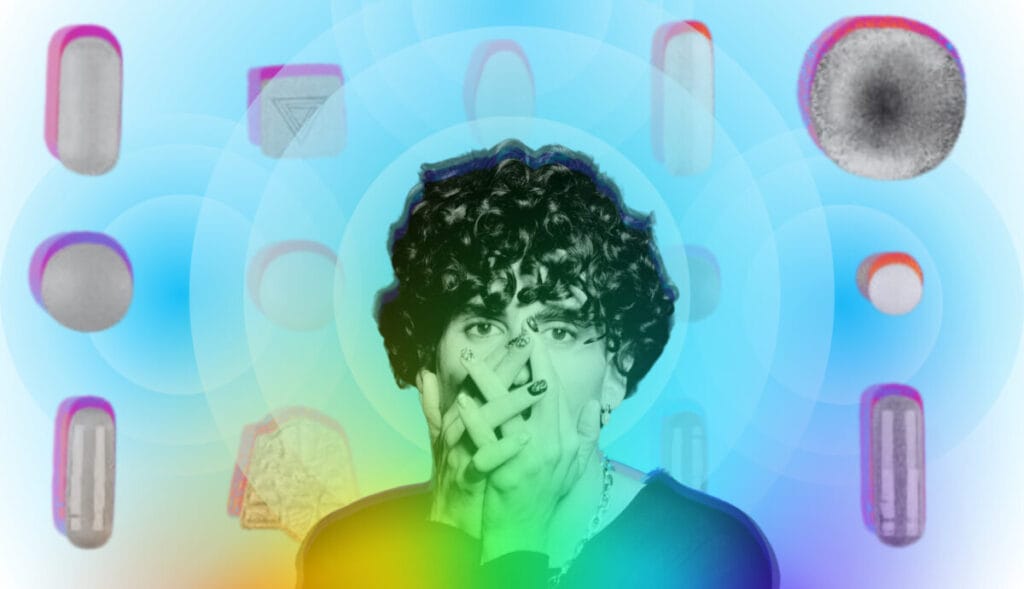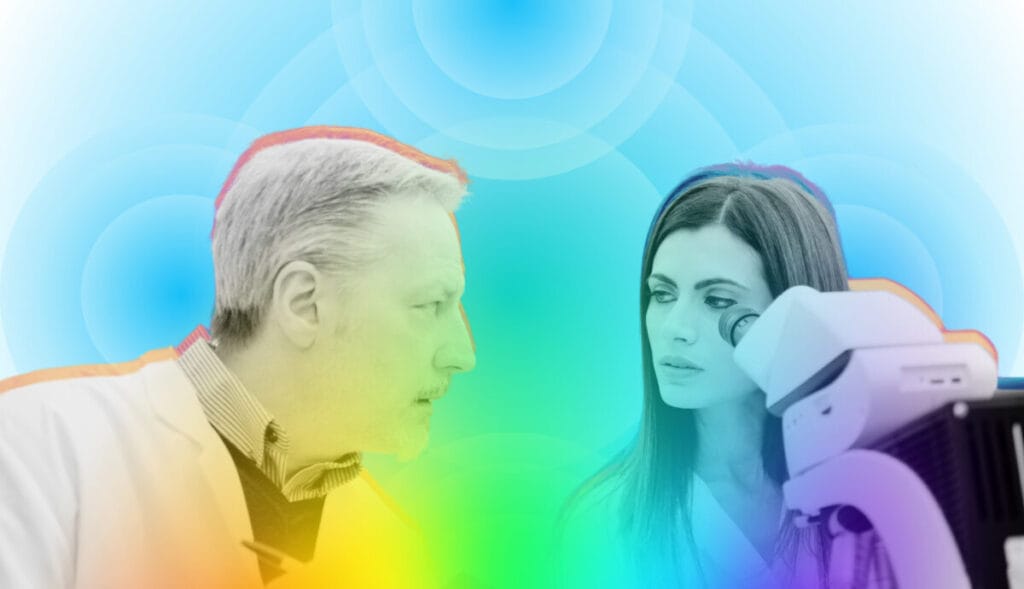Imagine a world where psychedelic-assisted therapy helps alleviate the mental health inequities faced by LGBTQ+ communities. This breakthrough could be closer than we think.
In recent years, psychedelic-assisted therapy has re-emerged as a promising frontier in mental health treatment. With substances like psilocybin and MDMA showing efficacy in recent clinical trials in treating major depressive disorder and post-traumatic stress disorder (PTSD), respectively, the prospect of psychedelic medicine is becoming more distinct, though uncertainties clearly remain.
However, as this field progresses, it is crucial to ensure that the benefits of these innovative treatments are accessible to all, particularly to those in marginalized communities. This includes sexually and gender-diverse people (or LGBTQ+ communities), who remain underrepresented in clinical research despite facing disproportionately high, inequitable rates of mental health challenges.
What are the current mental health disparities among LGBTQ+ communities, the limitations of the current psychedelic research landscape, and how we may move forward to improve clinical science and promote health equity? And further, how could psychedelic-assisted therapy alleviate minority stress-related mental health challenges among LGBTQ+ communities?

LGBTQ+ Mental Health and Minority Stress
LGBTQ+ individuals, encompassing a diverse spectrum of sexual and gender identities, experience unique stressors related to their minority status, or, more specifically, minoritization and oppression. These stigma-related stressors include chronic and persistent experiences of identity-related discrimination, interpersonal and internalized stigma, and expectations of rejection, all of which contribute significantly to mental health disparities, including higher rates of depression and anxiety beginning in childhood and adolescence.
The Centers for Disease Control and Prevention (CDC) found in their Youth Risk Behavior Survey that over 20% of sexually diverse youth attempted suicide in 2021, compared to 6% of their heterosexual peers. Of note, the mental health climate varies among the sub-groups within the LGBTQ+ communities, with the CDC finding that over 30% of trans and gender-diverse youth attempted suicide in 2019 (compared to 7.3% of their cisgender peers). These alarming statistics underscore the urgent need for targeted mental health interventions for LGBTQ+ patient populations.
The minority stress theory, as initially developed by Ilan Meyer, provides a framework for understanding these disparities. This theory has been routinely supported by empirical data and posits that the chronic stress experienced by LGBTQ+ individuals due to societal stigma and discrimination – or minority stress – has profound negative effects on their mental health.
Meyer describes a ‘distal-proximal continuum,’ where distal minority stressors include stressors independent of individual psychological processes, like identity-related violence or family and peer rejection, while proximal minority stressors include stressors dependent on individual appraisals, such as internalized homo- and transphobia, or chronic threat vigilance.
Given these mental health considerations unique to LGBTQ+ communities, there is a pressing demand to investigate and potentially tailor psychedelic-assisted therapy within the contexts of these specific minority stressors to improve LGBTQ+ mental health outcomes.

Flaws in Current Psychedelic Research for LGBTQ+ Communities
Current clinical trials on psychedelic-assisted therapy have been criticized for their lack of diversity, particularly the underrepresentation of racially minoritized communities and LGBTQ+ communities. Indeed, the vast majority of recent clinical trials have not collected data on the trial participants’ sexual orientation and gender identity, leaving outstanding treatment questions for the LGBTQ+ communities.
The inclusion of LGBTQ+ participants in these clinical trials is not just a matter of equity but also scientific rigor and generalizability, as detailed by the National Academies of Sciences, Engineering, and Medicine. Additionally, understanding how psychedelic-assisted therapy interacts with the unique minority stressors faced by LGBTQ+ individuals may lead to more effective and inclusive treatment protocols.
A recent perspective published in Nature Mental Health by our team emphasizes the necessity of inclusive research, noting that systematic collection of sexual orientation and gender identity (SOGI) data is crucial for assessing the impact, if any, of psychedelic-assisted therapy on minority stress processes.
Additionally, the article describes how the integration of minority stress theory with existing models of psychedelic action, such as the relaxed beliefs under psychedelics (REBUS) model, offers a promising avenue for future research. The REBUS model theorizes that psychedelics are therapeutic as they make entrenched, maladaptive cognitive and behavioral patterns more malleable, ripe for establishing newer patterns of behavior and facilitating examination of old patterns.
For LGBTQ+ individuals, whose mental health may be compromised by deeply ingrained negative beliefs and expectations due to chronic minority stress, such as internalized homo- and transphobia, this psychological flexibility may be particularly therapeutic. In theory, by alleviating the rigid, maladaptive cognitive and behavioral patterns associated with minority stress, psychedelic-assisted therapy may facilitate profound psychological healing and resilience among LGBTQ+ communities. However, until research becomes more equitable, much will remain unknown for the LGBTQ+ communities–and these theories will remain hypotheses.
How LGBTQ+ Psychedelic Research Can Improve
To advance this research, several steps are essential.
First, there must be focused recruitment efforts, with study and site-specific strategies, to ensure the inclusion of diverse sexual and gender identities in psychedelic clinical trials.
Second, researchers need to systematically collect and analyze SOGI data to understand specific impacts of psychedelic-assisted therapy on sexually and gender-diverse populations, who make up over 20% of Generation Z, according to a recent Gallup Poll.
Third, clinical trials should incorporate outcomes designed to assess minority stress processes explicitly.
And finally, developing and testing SGM-affirmative adaptations of psychedelic-assisted therapy protocols will be crucial in making these therapies potentially more effective and accessible to LGBTQ+ individuals. Importantly, such efforts must be complemented by comprehensive initiatives to establish an inclusive, affirming, and empowering environment for LGBTQ+ trial participants across each phase of the clinical trial.
These efforts, however, must be mentioned in conjunction with addressing the historical distrust between the LGBTQ+ communities and the medical establishment. LGBTQ+ individuals have experienced discrimination and stigmatization in health care settings and research, which can deter them from seeking care or participating in clinical trials.
Rebuilding trust requires the inclusion of LGBTQ+ researchers, clinicians, and community members in the design and implementation of psychedelic-assisted therapy clinical trials, with explicit acknowledgment and redress of this harmful past. This approach better ensures that future research is conducted in a culturally competent, trauma-informed manner, fostering a safer and more welcoming environment for LGBTQ+ trial participants.

Moving Forward with LGBTQ+ Inclusivity
The potential for psychedelic-assisted therapy to address the mental health disparities faced by LGBTQ+ communities deserves our attention. Realizing the potential of psychedelic-assisted therapy requires a concerted effort to include these populations in inclusive, affirmative research and to investigate treatments tailored to their unique health needs.
As the field of psychedelic research moves forward, it must do so with a commitment to inclusivity and equity, ensuring that the benefits of these groundbreaking therapies are available to all who need them. By expanding the scope of psychedelic clinical trials to include LGBTQ+ populations, while exploring LGBTQ-affirmative treatment models, we can move towards a more inclusive, effective, and compassionate approach to psychedelic research and mental health care. It is also imperative to rectify the historical underrepresentation and to advance mental health equity in meaningful ways.
As we continue to explore the therapeutic potential of psychedelics, let us do so with a vision of health care that embraces and uplifts every individual, importantly recognizing sexual and gender diversity. In doing so, we will not only enhance the validity and applicability of research findings but also ensure that the transformative potential of psychedelic-assisted therapy reaches those who need it most.
The journey towards mental health equity is long, but with deliberate and inclusive efforts, we can make significant strides in creating a world where every individual, regardless of their sexual or gender identity, can access and benefit from cutting-edge mental health treatments.


